So that grapes always pleased with abundant fruiting, it must be fertilized, protected from diseases and insect pests. Among the variety of preparations, gardeners choose iron sulfate for grapes and other fruit shrubs. So that treatment with the drug is only beneficial, you need to follow the instructions. Experienced growers know exactly how to dilute the drug to the desired concentration, how to apply it at different periods of vegetation, how to properly process the plant. Compliance with the recommendations of specialists - high yield beautiful and delicious fruits.
Content
Why is iron sulfate used?
Iron sulfate is produced in the form of crystals of a bluish-green hue, which under the influence of oxygen turn yellow. The basis of the drug is iron sulfate. The powder is completely soluble in water. Prepared means spray plants or water them under the root.
Iron sulfate has the following advantages:
- low cost;
- wide range of applications;
- the drug is harmless at the recommended dosage.
Iron sulfate improves the growth of grapes, increases its yield. Preventive spraying destroys the spores of fungi that cause the development of dangerous diseases. The drug contains a sufficient amount of iron, which is easily absorbed by plants. None other top dressing not able to make up for the deficiency of an important element as quickly as iron sulfate.
Main action
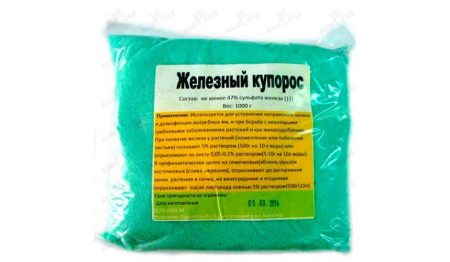
The use of ferrous sulfate stimulates the formation of chlorophyll. The bushes develop correctly, the color of the leaves becomes more saturated. With regular processing of grapes with iron sulfate, the elasticity of the bark improves, lateral shoots are actively formed, and the berries grow large and healthy. The tool repels and destroys pests, effectively protects against fungal infections.
Gardeners use iron sulfate for such purposes:
- pest control;
- prevention and treatment of fungal diseases;
- disinfection of wounds;
- replenishment of iron deficiency;
- getting rid of lichens and mosses;
- disinfection of garden equipment, vegetable stores.
With timely treating a disease recedes within a few months, and in the new season no symptoms are detected. Feeding grapes with a solution of iron sulfate promotes the formation of chlorophyll. Bushes become stronger, grow faster, bear fruit abundantly. With systematic spraying, the condition of the bark and green parts of the plant improves.
When using iron sulfate, one should take into account such features that relate to the disadvantages of the drug:
- does not neutralize pathogenic bacteria;
- the risk of burns on young growth;
- acts only on the surface of plants, without penetrating into their tissue;
- rapid oxidation of the drug in air, which leads to the loss of beneficial properties;
- short period of action - no more than 14 days.
Mechanism of action
The action of iron sulfate is the formation of a thin film on the surface of the vine, which has a protective property. Active substances do not penetrate plant cells. Grapes are treated with iron sulfate for prophylactic and therapeutic purposes. Bushes must be thoroughly irrigated without leaving any missing areas.
The active substance acts only for 2 weeks, and then is neutralized. The coating formed as a result of spraying grapes with iron sulfate slows down the blooming of the kidneys for 14-20 days. Such a measure avoids the negative impact of spring frost: a decrease in yield or death of bushes.
Terms and conditions of processing
The vineyard is recommended to be treated with iron sulfate 2 times a year. The first spraying is carried out in the early spring before the formation of buds, and the second - before the autumn frosts, after trimming the extra and damaged stems. For grape processing A dry, calm day will do. It is better to choose a time when rain is not expected, because the product is easily washed off with water. If a fungal infection is present on the vine, after the solution dries up, the lesion sites become dark.
Spring processing

Grapes - a thermophilic plant, sensitive to sudden changes in temperature. Spring weather is changeable. After sunny days, frost can be harmful to the formed kidneys. To protect the plants, they are treated immediately upon the arrival of warm days. Bushes that "wake up" from hibernation are freed from shelter and thoroughly sprayed. To prepare a 0.5% working solution, you will need a bucket of water and 50 g of powder. Spray the grapes using a spray bottle with a pump.
To improve the rooting of cuttings, experienced growers treat their top with a 0.5% solution of ferrous sulfate. This measure inhibits the development of the kidneys, stimulates the formation of young roots. Treated cuttings take root faster and grow well.
Autumn processing
At the end of the growing season, when the processes freeze, it is recommended to carry out preventive treatment. Bushes are irrigated after harvest and leaf fall. Mold and rot will not appear on the grapes, if not only the vine, but also the soil around the plants is treated with iron sulfate in the fall. Fallen leaves need to be collected, because decaying particles form the nutrient medium necessary for the life of microorganisms.
A solution of iron sulfate for grapes in autumn is prepared in different proportions: for irrigation of young plants, a concentration of 3% is used, and for mature bushes, 5%. In 10 l of water, respectively, add 300 g or 500 g of the drug. Grapes are sprayed in the fall before shelter for the winter. Optimal dates are the end of October or the first decade of November. After processing, a kind of coating forms on the vine that protects the grapes from the cold. Sprayed plants tolerate winter frosts better. They do not settle on fungi and insects that can damage the bushes under cover.
Application for vineyards
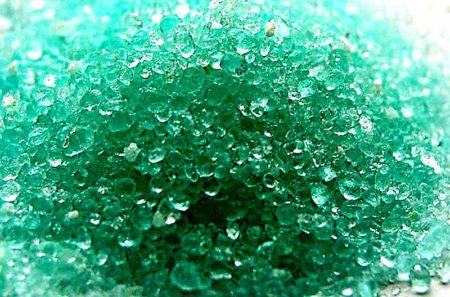 Iron sulfate is used in two ways: irrigation and root dressing. Fertilizer is introduced in a complex manner, in addition to iron, plants receive all the necessary elements.Vineyard processing is carried out not only in spring or late autumn, but also in summer, if the plants were ill with fungal diseases.
Iron sulfate is used in two ways: irrigation and root dressing. Fertilizer is introduced in a complex manner, in addition to iron, plants receive all the necessary elements.Vineyard processing is carried out not only in spring or late autumn, but also in summer, if the plants were ill with fungal diseases.
Top dressing
The yield of fruit crops depends on the intake of micronutrients from the soil. An important role in the cultivation of the vineyard is assigned to iron sulfate. Its use activates the production of chlorophyll, which improves the accumulation of nutrients in plant tissues. As a result, the bushes become stronger, the number of ovaries increases.
The lack of iron in grapes is determined by the following characteristics:
- Chlorosis develops - a disease resulting from a violation of the formation of chlorophyll. Pale leaves with green veins appear on the bushes.
- Shoots are slowly growing.
- Bunches of grapes do not pour even under favorable weather conditions.
Not enough iron is found in scarce or alkaline soils. You can increase the concentration of a useful element by feeding. For the prevention and treatment of chlorosis, iron sulfate is used as a fertilizer. The substance dissolved in water is well absorbed by plants. You can saturate the bushes with iron by spraying the drug on a sheet or by applying it to the ground.
With leaf chlorosis, a 0.05% solution is used: 5 g of the drug is mixed with 10 l of water. Grapes are irrigated 2 times a week. As the plants become saturated with iron, the leaves become dark green. If in the past season the clusters turned out to be unripe, they recommend spraying the grapes in early spring. To make fertilizer under the bushes, a nutrient mixture is prepared in the ratio of 100 g of iron sulfate per 10 kg of compost. Such an amount will be enough for 1 m2. Top dressing is made in the digging of the soil.
Pest protection
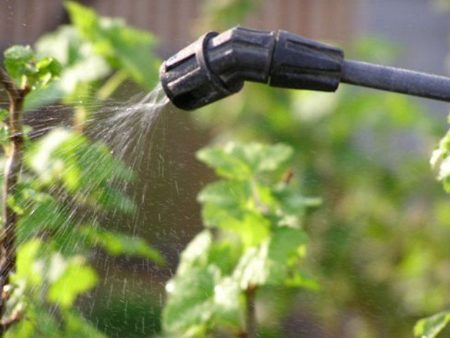
Pest insects can settle on fruit bushes: leafworm, grape pads, worms, ticks, phylloxera, cicadas, odorous woodworm, goldfish. To destroy their colonies and laid eggs, the vineyard is twice treated with 5% solution of iron sulfate. The interval between spraying should be at least 7 days. With the help of such processing, 40-50% of the eggs of the apple thistle can be destroyed.
In the middle zone of planting grapes irrigated with a solution of iron sulfate on April 10-20. If you hurry with the processing, the insects hidden under the bark will remain unharmed. To determine the suitable processing time, you need to focus not on the calendar, but wait for the plants to awaken. With a prolonged winter, the treatment is postponed to the end of April. Preventive measures can be taken sooner as soon as the kidneys swell.
Disease control
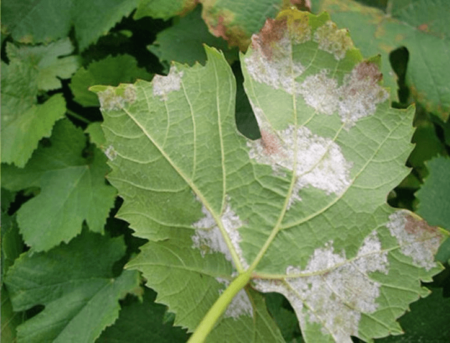
Most often, grapes are affected by spotty necrosis, anthracnosis, oidium, mildew. Pathogenic microorganisms develop in the cortex, the remains of fallen leaves or uncleaned hands. Although iron sulfate does not belong to special fungicidal preparations, it copes with fungi very well. It creates an acidic environment that is harmful to many germs.
To destroy the pathogens of gray rot, powdery mildew, a 4-5% solution of iron sulfate is used, which is effective in combating fungal infection. Vineyard process 2 times, taking a break for 14 days. A concentrated solution effectively removes the disease from the surface of the cortex. Plants should be treated when the first signs of damage appear. Otherwise, when winter comes, the grapes will die.
How to get rid of lichens and mosses
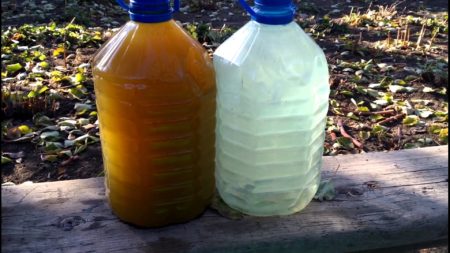
If mosses and lichens appeared on the grapes, the bushes are sprayed in early spring with a 3% solution of iron sulfate. Only the lower part of the trunk is processed, where the growths are concentrated.After twice spraying, the interval between which is 2 weeks, the parasites will fall away on their own. By mid-summer, the bark is fully restored.
A special solution will help get rid of lichens and mosses. For its preparation, an extract from ash and a 5% solution of iron sulfate will be required. Such a composition treats all affected areas. To get an extract, 1 glass of ash is mixed with 3 liters of boiling water, and after 3 days add 7 liters of water.
Wound Treatment and Vine Disinfection
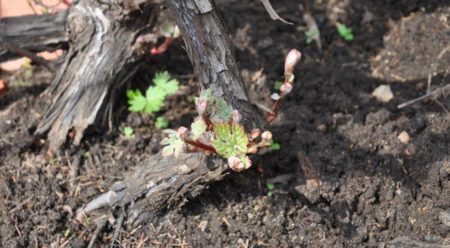
After a harsh winter, wounds may appear on the vine. If left untreated, the infection will penetrate the wood and destroy it. In the spring, a solution prepared in the proportion of 100 g of iron sulfate per 1 liter of water is applied to the cracks. After the mixture dries, a protective film forms on the lesions. It is easily washed off by rains, therefore processing needs to be repeated periodically.
During fruiting, iron sulfate serves as a means of protection against infection, although the plants themselves are not treated with a solution. If there is a waste pit, bacteria, or fungi can get on grapes. An unfavorable place is recommended to fill with a 5-7% solution. Iron sulfate is an ideal disinfectant, as it has a detrimental effect on microbes.
Precautionary measures
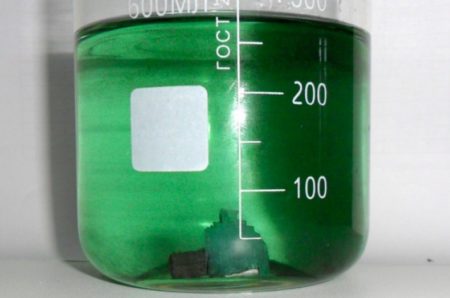
The solution of ferrous sulfate is non-toxic to humans. If it comes into contact with the skin, it can be easily washed off with water. However, before processing plants, it is better to wear rubber gloves, goggles and a respirator. The powder must be kept away from food, out of the reach of children. It is important to know how to breed iron sulfate so that it does not burn the green parts of the plant.
The use of iron sulfate requires compliance with these rules:
- Do not exceed the recommended concentration of the solution and the frequency of processing. An overdose causes burns on plant tissues, as the drug contains aggressive acids.
- It is undesirable to spray plants during growth and fruiting.
- During the application of iron sulfate for grapes during the growing season, you need to prepare a weakly concentrated solution.
- Clean containers should be used to dilute the powder. Metal dishes will not work.
- Stir the product thoroughly so that the crystals are completely dissolved in water.
Reviews
Vladimir
Caring for my vineyard, I use only iron sulfate. 4% solution copes well with diseases. In the summer I don’t apply it, because you can simply burn all the green growth. Top dressing is effective against chlorosis. With regular use of the drug, grapes do not get sick and are rarely affected by pests.
Marina
During the cultivation of grapes I used various means of protection against harmful insects and fungal diseases. I opted for iron sulfate. I liked that one drug solves several problems at once: it cures fungal diseases, destroys lichens. Using this tool, you can not worry about the health of your family.
On the shelves of stores there are a huge number of new drugs that easily cope with pests, fungi and bacteria. However, iron sulfate remains popular with many gardeners. It is considered a universal remedy. Proper processing of the vineyard with a solution of iron sulfate provides high productivity, protection from pests and dangerous diseases.

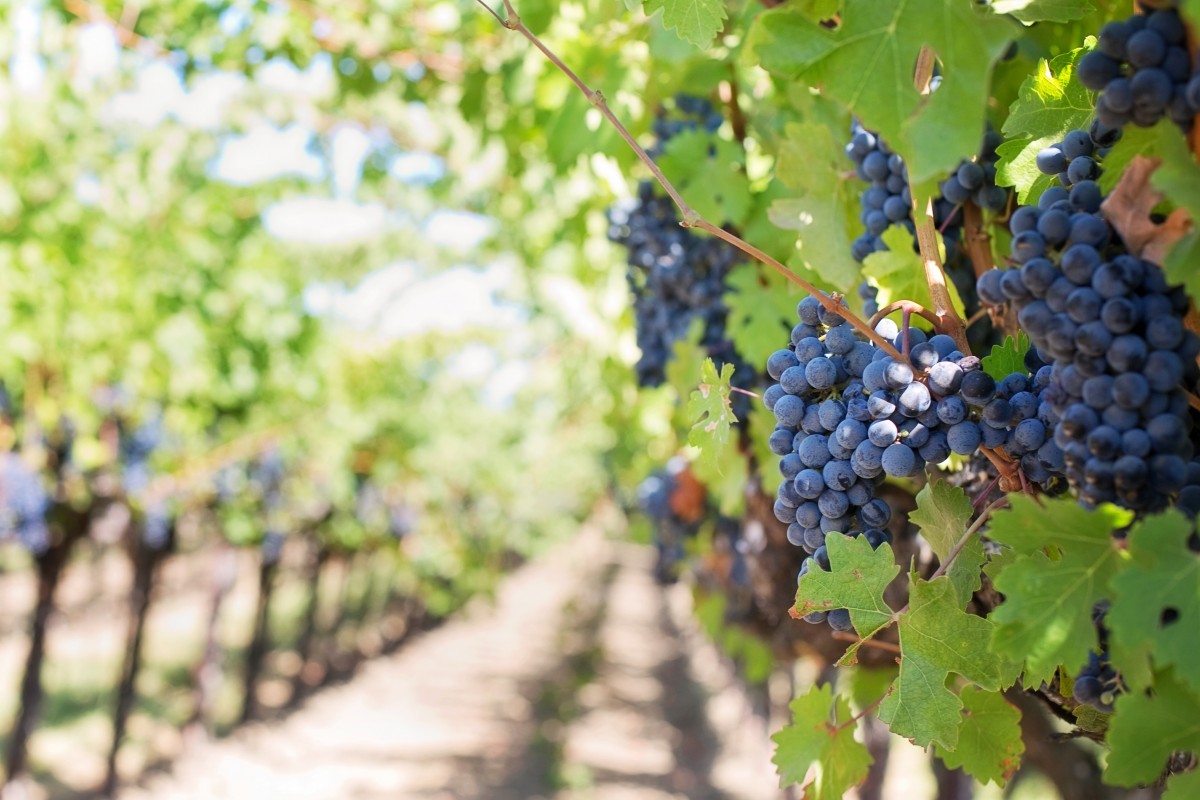
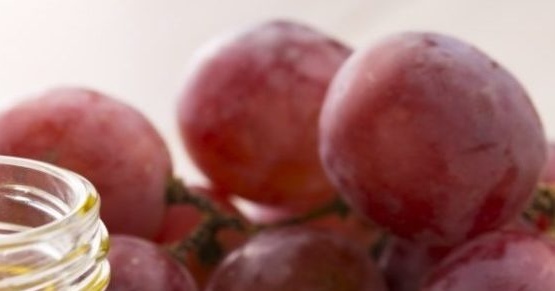
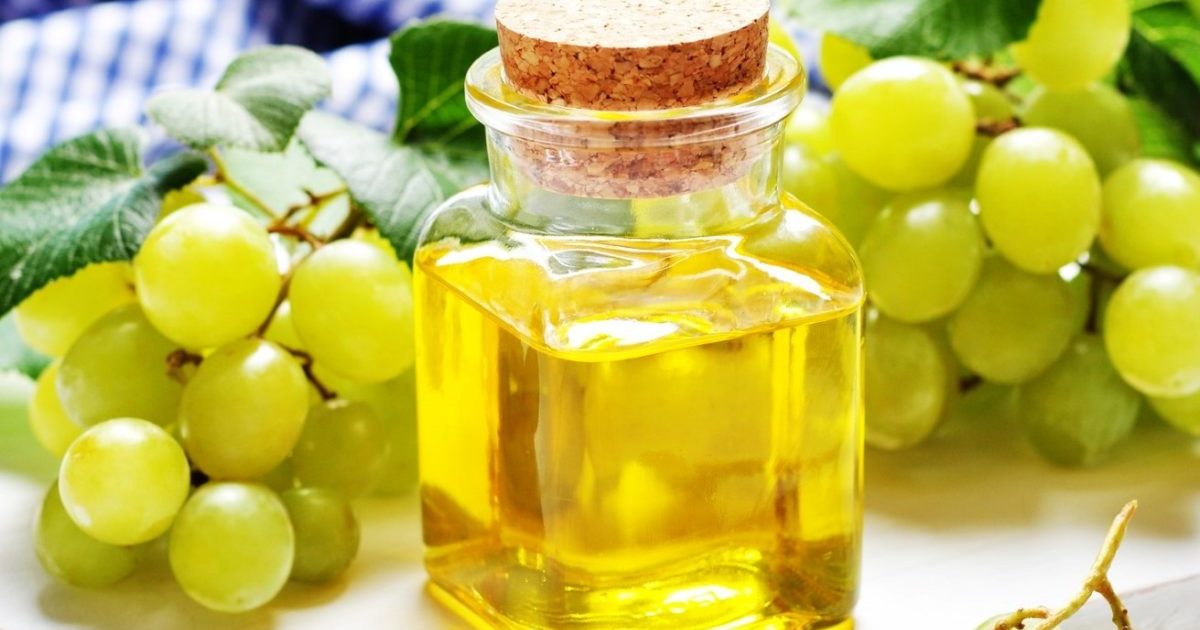
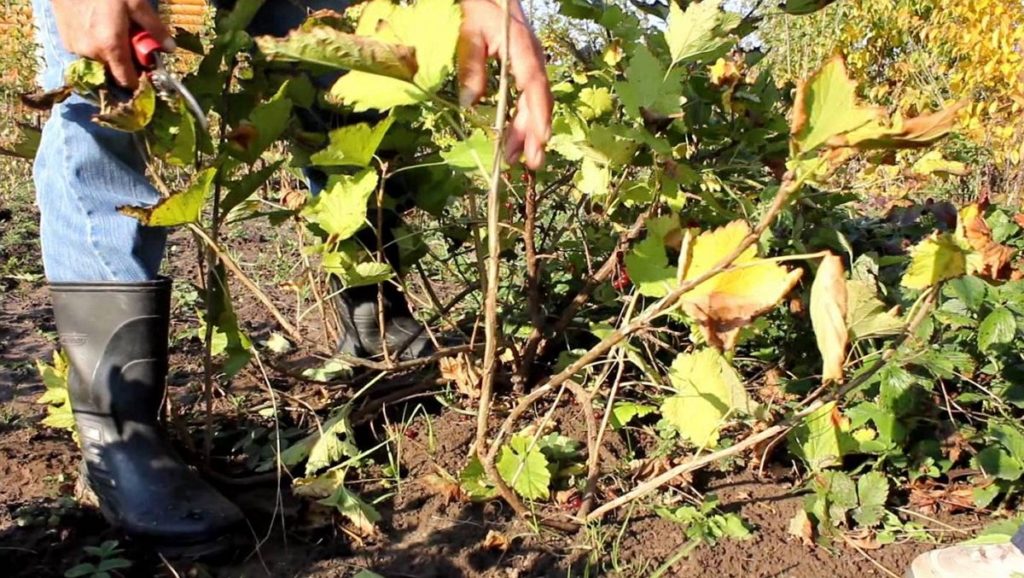
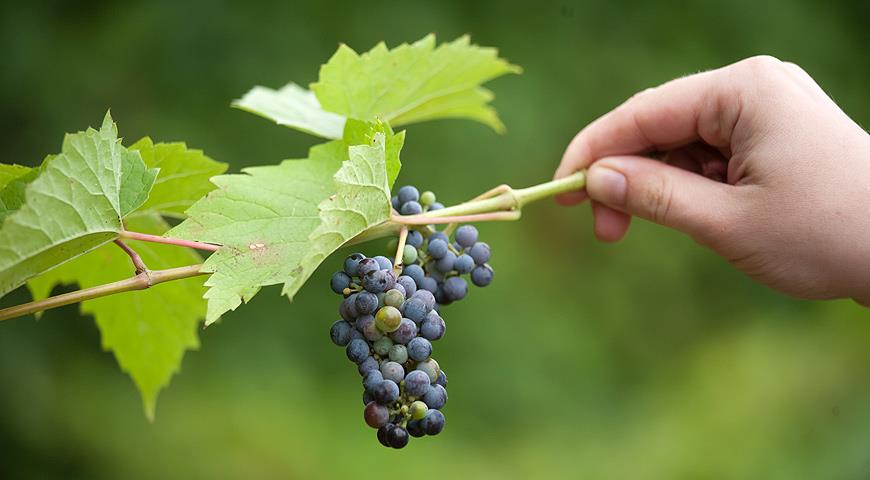 Non-covering winter-hardy grape varieties for Moscow region
Non-covering winter-hardy grape varieties for Moscow region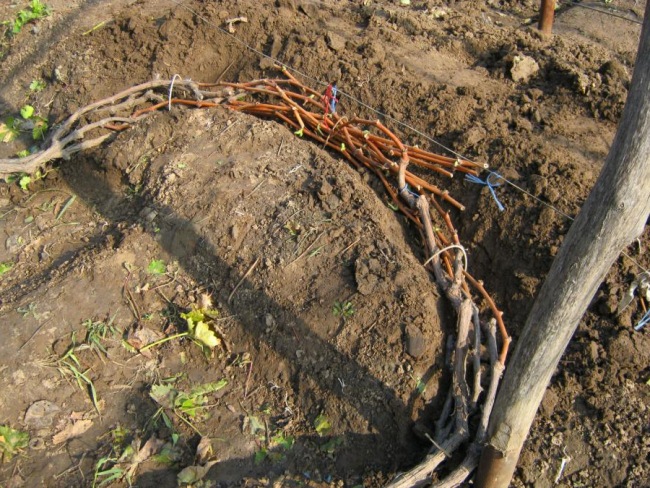 How to keep the vine in winter
How to keep the vine in winter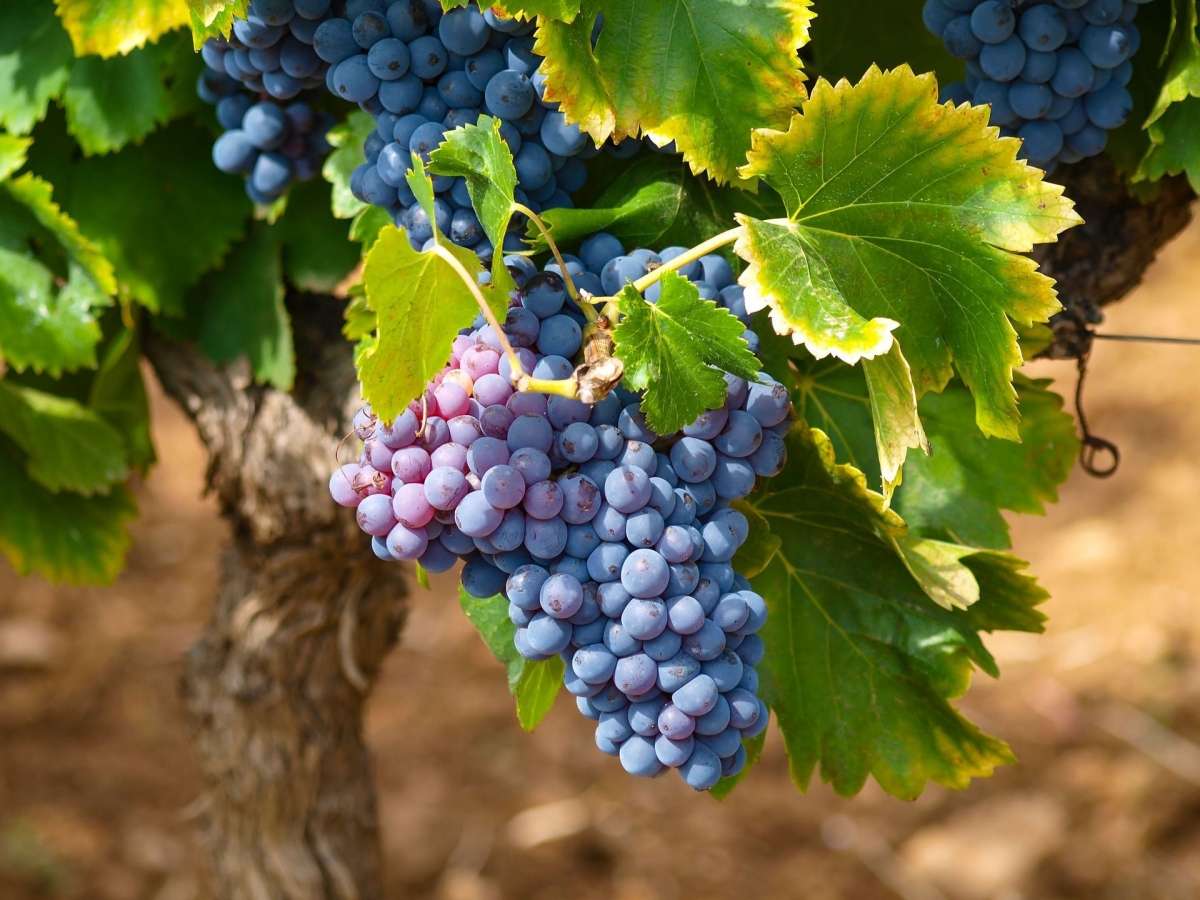 When can I transfer grapes to another place in the fall
When can I transfer grapes to another place in the fall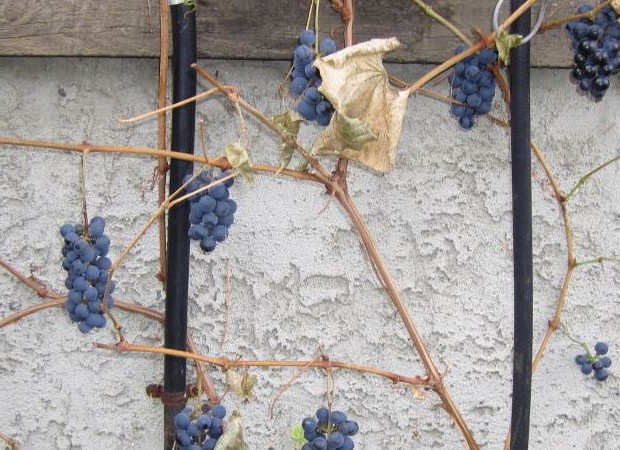 How to cover and prepare grapes for the winter in the suburbs
How to cover and prepare grapes for the winter in the suburbs